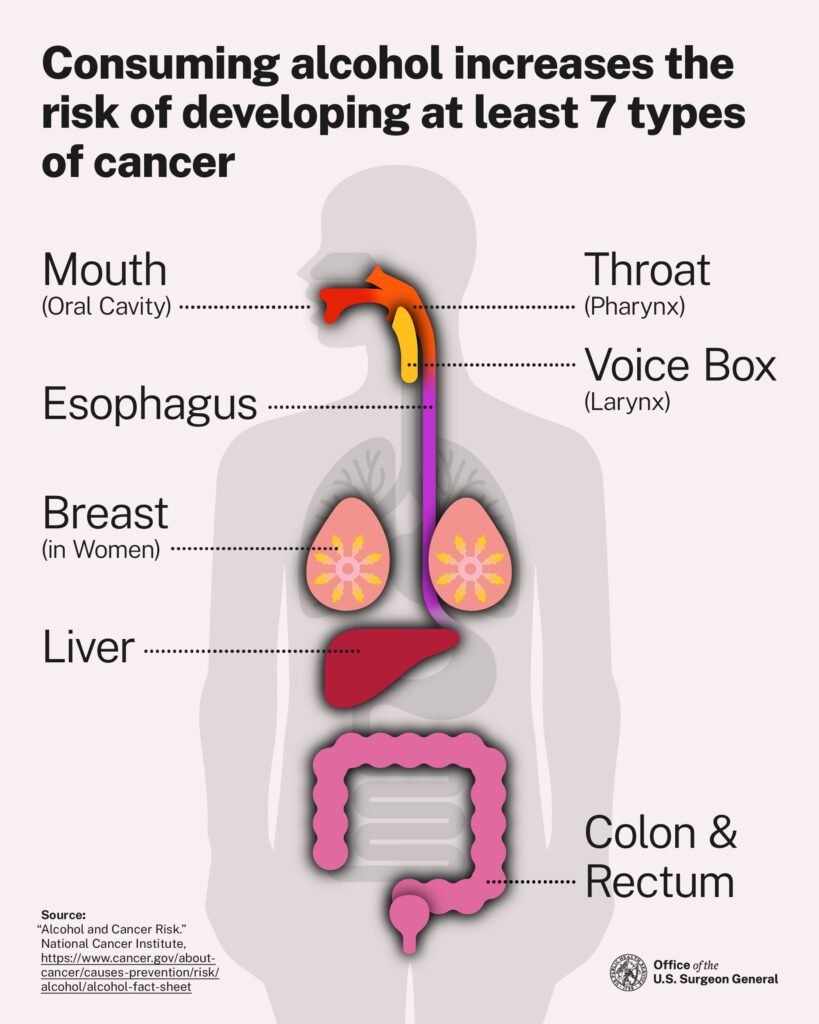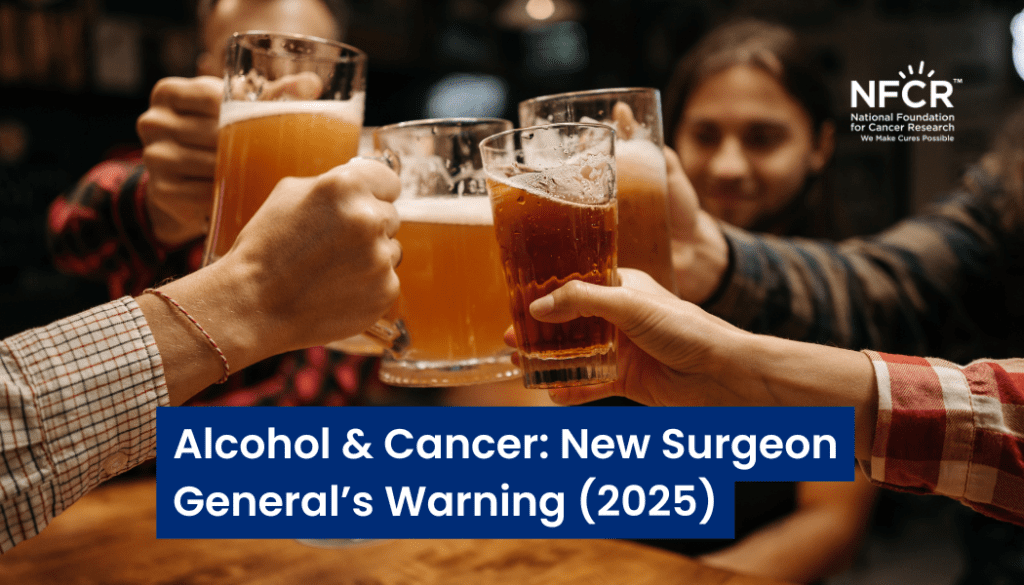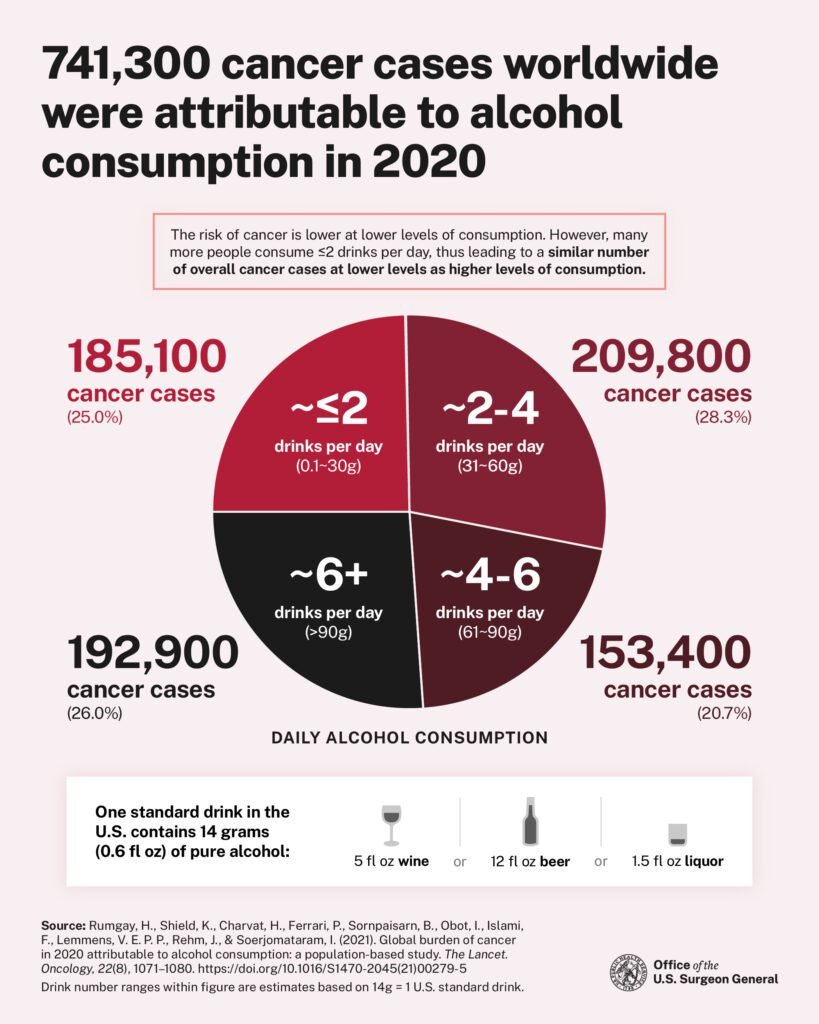Surgeon General Alcohol Cancer Risk: Understanding the Health Warning and Its Impact
Alcohol consumption has long been associated with various health risks, but recent advisories from the U.S. Surgeon General have intensified discussions about its direct link to cancer risk. The advisory highlights the dangers of alcohol as a known carcinogen, urging for greater public awareness and potential labeling changes on alcoholic beverages.
In this article, we will explore:
- What the Surgeon General’s Advisory Says About Alcohol and Cancer Risk
- How Alcohol Increases Cancer Risk
- Types of Cancer Linked to Alcohol Consumption
- The Need for Alcohol Warning Labels
- Global Responses to Alcohol and Cancer Awareness
- How to Reduce Alcohol-Related Cancer Risks
- Frequently Asked Questions (FAQs) on Alcohol and Cancer Risk
Understanding the surgeon general alcohol cancer risk warning can help individuals make informed health choices, leading to lower cancer rates and improved public health.

What the Surgeon General’s Advisory Says About Alcohol and Cancer Risk
In January 2025, U.S. Surgeon General Dr. Vivek Murthy issued a significant public health advisory about the link between alcohol and cancer. This warning emphasized:
- Alcohol is a proven carcinogen that increases the risk of multiple types of cancer.
- Public awareness of this risk is shockingly low, with less than 50% of Americans knowing about the alcohol-cancer link.
- There is a need for updated warning labels on alcoholic beverages to inform consumers about the cancer risks associated with alcohol.
- Alcohol is responsible for approximately 100,000 cancer cases and 20,000 cancer-related deaths annually in the U.S.
The advisory aims to bridge the gap in public knowledge, advocating for stronger alcohol labeling laws similar to tobacco products.
How Alcohol Increases Cancer Risk
Alcohol increases cancer risk through several biological mechanisms, making even moderate drinking a health concern.
1. Alcohol Metabolism and DNA Damage
When the body processes alcohol, it produces acetaldehyde, a toxic byproduct that can damage DNA and proteins in cells. Damaged DNA can lead to mutations that cause cancer.
2. Oxidative Stress and Inflammation
Alcohol metabolism generates reactive oxygen species (ROS), which increase oxidative stress. This process damages cells, leading to chronic inflammation, a key factor in cancer development.

3. Hormonal Changes and Increased Estrogen Levels
Alcohol consumption raises estrogen levels, particularly in women, increasing the risk of breast cancer. High estrogen levels promote the growth of hormone-sensitive cancers.
4. Reduced Ability to Absorb Key Nutrients
Alcohol impairs the body’s ability to absorb essential nutrients like folate, a B-vitamin crucial for DNA repair. Low folate levels can increase the risk of certain cancers.
5. Alcohol and the Immune System
Regular alcohol consumption can weaken the immune system, reducing the body’s ability to identify and destroy cancerous cells before they grow into malignant tumors.
Types of Cancer Linked to Alcohol Consumption
Scientific studies confirm that alcohol consumption increases the risk of at least seven types of cancer.
1. Breast Cancer
- Even light drinking increases breast cancer risk.
- Women who consume one drink per day have a 7-10% higher breast cancer risk than non-drinkers.
2. Colorectal Cancer
- Alcohol increases the risk of colorectal (colon and rectal) cancer by damaging intestinal cells.
- Even moderate alcohol intake is associated with a higher risk of colorectal cancer.
3. Liver Cancer
- Chronic alcohol consumption leads to liver cirrhosis, a major risk factor for liver cancer.
- Heavy drinking dramatically increases liver cancer risk.
4. Esophageal Cancer
- Alcohol consumption damages the lining of the esophagus, leading to increased esophageal cancer risk.
- The risk is even higher in individuals with genetic variations affecting alcohol metabolism.
5. Mouth and Throat Cancers
- Alcohol damages the mucous membranes of the mouth and throat, allowing carcinogens to enter cells more easily.
- Combining alcohol with smoking increases the risk exponentially.
6. Laryngeal (Voice Box) Cancer
- Alcohol increases irritation and inflammation in the larynx, raising the risk of laryngeal cancer.
7. Stomach Cancer
- Alcohol may increase the risk of stomach cancer, especially in combination with poor diet and Helicobacter pylori infections.
The more alcohol a person consumes, the higher the cancer risk—making any reduction in alcohol intake beneficial for cancer prevention.

The Need for Alcohol Warning Labels
The Surgeon General’s advisory calls for updated alcohol labeling laws, similar to those seen on tobacco products.
Why Are Warning Labels Needed?
- Most people are unaware of the alcohol-cancer risk.
- Studies show that clear warning labels influence health-conscious decisions.
- Countries like Ireland, Australia, and Canada have already taken steps to implement cancer warnings on alcohol products.
The advisory supports mandatory alcohol warning labels in the U.S., helping consumers make informed choices about their drinking habits.
Global Responses to Alcohol and Cancer Awareness
Countries worldwide are taking steps to increase public awareness of alcohol’s link to cancer.
1. Ireland’s Alcohol Warning Labels (2023)
Ireland became the first country in Europe to implement mandatory cancer warnings on alcohol products.
2. Australia’s Alcohol Labeling Laws (2019-Present)
Australia mandates pregnancy warnings on alcoholic beverages and is considering expanding labels to include cancer risks.
3. Canada’s Alcohol and Cancer Study (2017)
- In Yukon, Canada, a study placed “Alcohol can cause cancer” labels on bottles.
- Industry pushback stopped the initiative, but public awareness dramatically increased.
4. The U.S. Surgeon General’s Initiative (2025)
The Surgeon General’s call for warning labels aims to align the U.S. with global efforts to reduce alcohol-related cancer risks.
How to Reduce Alcohol-Related Cancer Risks
1. Limit Alcohol Intake
- The less alcohol you consume, the lower your cancer risk.
- Moderate drinking limits (per U.S. guidelines):
- Men: Up to 2 drinks per day
- Women: Up to 1 drink per day
2. Opt for Alcohol-Free Alternatives
- Many companies now offer non-alcoholic beers, wines, and spirits as alternatives.
3. Stay Educated on Alcohol and Health
- Read up on the latest research about alcohol and cancer risk.
- Support public health policies that increase awareness.

Conclusion: Surgeon General Alcohol Cancer Risk Advisory—A Call to Action
The Surgeon General alcohol cancer risk serves as a wake-up call and also as a warning about the link between alcohol and cancer risk for both individuals and policymakers.
Understanding the health risks of alcohol can help reduce cancer cases, promote informed choices, and improve public health policies.
1. Does drinking alcohol in moderation still increase cancer risk?
Yes. Even light to moderate drinking increases the risk of certain cancers, including breast and colorectal cancer. The safest approach is to limit alcohol intake or avoid it altogether.
2. Are certain types of alcohol safer than others in terms of cancer risk?
No. All types of alcohol (beer, wine, liquor) contribute to cancer risk. The key factor is ethanol content, which is present in all alcoholic drinks.
3. What are the Surgeon General’s recommendations for reducing alcohol-related cancer risks?
Limit or avoid alcohol consumption.
Support updated warning labels on alcoholic beverages.
Raise awareness about the alcohol-cancer link to help others make informed choices.
